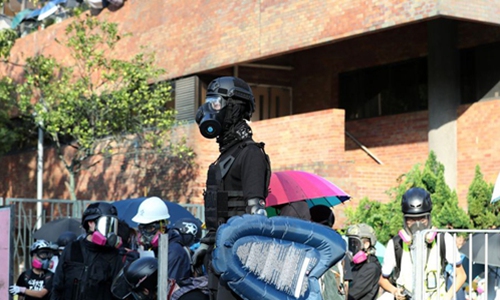HOME >> OPINION
HK high court usurped its authority
Source:Global Times Published: 2019/11/19 22:08:41

A masked rioter is standing out among his group in a standoff with police outside the Hong Kong Polytechnic University, November 17, 2019. Photo: Xinhua
A spokesperson of the Legislative Affairs Commission of the Standing Committee of the National People's Congress (NPC) on Tuesday said that the ruling by the High Court of Hong Kong - claiming the anti-mask law "unconstitutional" - is inconsistent with the Basic Law. He stressed that only the NPC Standing Committee can judge and decide whether laws are unconstitutional. The statement plays a significant role in clearing up the confusion and setting things right.
Monday's ruling by the high court has caused an extremely bad influence, which inspired the mobs and created confusion for the Hong Kong police. On Monday evening, a large swath of masked radical protesters hit the streets, with some of them acting like thugs, forming the largest-scale masked protest on Hong Kong streets since the anti-mask law was carried out in early October. The ruling struck at the root of anti-riot, anti-chaos efforts.
The ruling severely violated the Basic Law and stepped over the country's judiciary in a way that ordinary people can hardly understand. The high court is conveying its wrong position in the name of law. Its adverse guidance cannot be overrated.
Hong Kong's judicial system is often driven by certain forces' values and political stances, rather than being faithful to the law. Some judges have even betrayed the Basic Law, the Constitution of the People's Republic of China, the spirit of the law and their professional ethics.
The judiciary is a crucial part of cracking down on riots. But some judges fail to shoulder their responsibilities to restore Hong Kong's order.
They released arrested mobs in an unprincipled way, sending wrong signals to society and making radical protesters believe they can engage in violent activities, including attacking the police, almost without cost.
In fact, many radical rioters released by the courts had not learned from their mistakes. As soon as they were freed, they continued to impede the rule of law in Hong Kong, even with an illusion of being "heroes of democracy." Certain judges should be responsible for such an unhealthy tendency.
We strongly support the NPC Standing Committee's swift statement and call on the committee for more actions in the future to prevent judicial usurpation in Hong Kong.
There is no need for Beijing to pay attention to the slander from the West - China's central government is intervening in Hong Kong's high degree of autonomy. Hong Kong is part of China and all the power the special administrative region has is entitled by the central government.
Washington and London are quite proactive in raising their voices over Hong Kong affairs.
Who empowered them to throw their weight around over the case? How can they possibly have the nerve to claim that Beijing "interfered in" Hong Kong's affairs?
What US and Western politicians think does not need to be taken into account when it comes to how to govern Hong Kong. The city's development and prosperity is more important than anything else.
US Secretary of State Mike Pompeo recently made extreme comments on Hong Kong affairs. London has also made clear its attitude. Those remarks have encouraged Hong Kong radical protesters, indicated their hope to put more limits on Hong Kong police and weaken the Chinese government's right to govern the city. They want to see the governance in Hong Kong follow the command of the West. They are simply daydreaming.
Hong Kong belongs to China. Only the Chinese people, including Hongkongers, have the final say in the city's affairs.
Washington should not overestimate its cards to intervene in Hong Kong affairs. When it comes to cardinal issues of right and wrong, when Hong Kong faces historic choices, what the US has in its hand means nothing.
Posted in: EDITORIAL